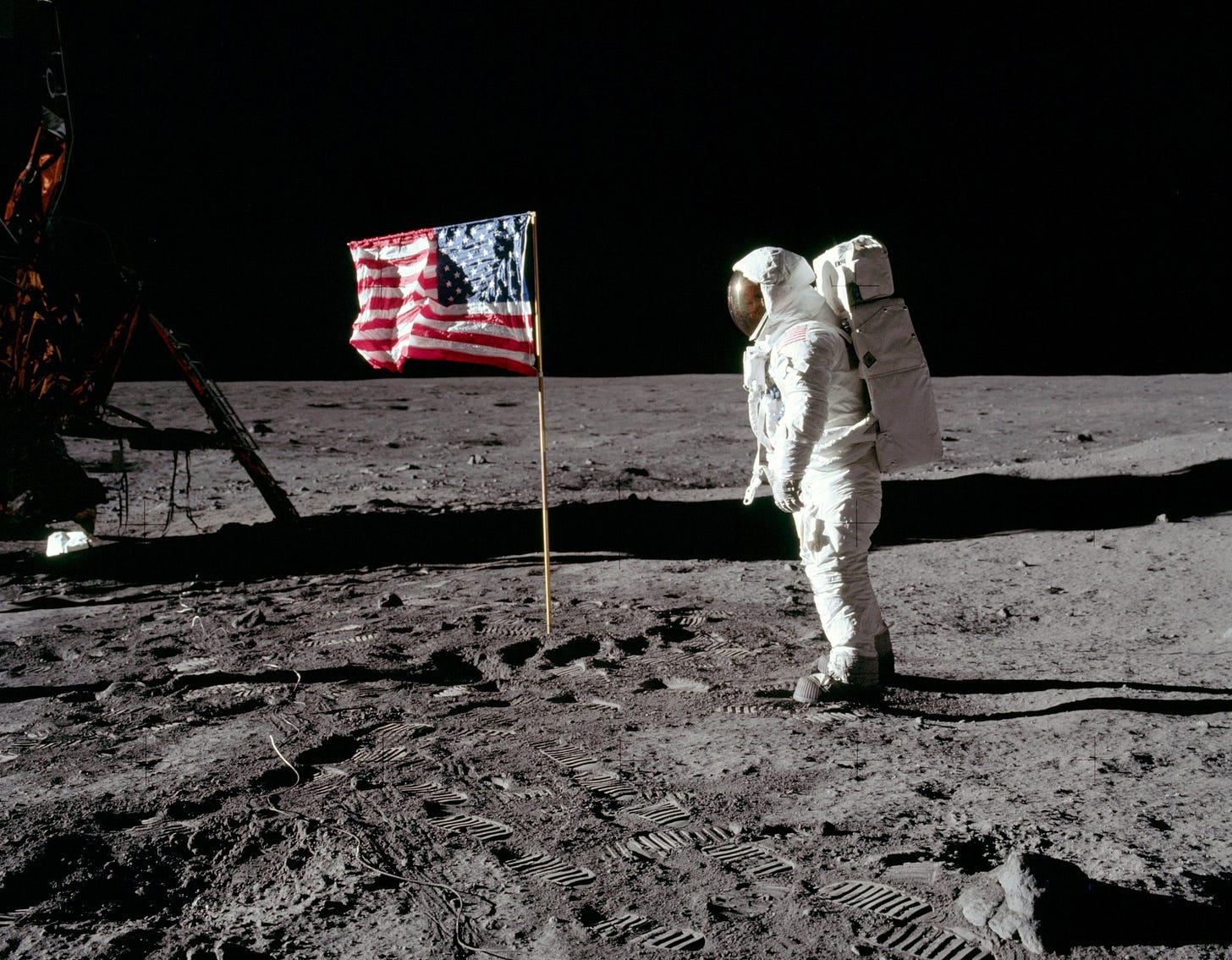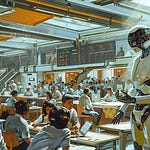Project Apollo was a feat of human achievement akin to, and arguably greater than, the discovery of the New World. From 1962 to 1972, NASA conducted 17 crewed missions, six of which placed men on the surface of the moon. Since the Nixon administration put an end to Project Apollo, our extraterrestrial ambitions seem to have stalled along with our sense of national optimism. But is the American spirit of adventure, heroism, and willingness to take extraordinary risk a thing of the past
Today on the podcast, I talk with Charles Murray about what made Apollo extraordinary and whether we in the 21st century have the will to do extraordinary things. Murray is the co-author with Catherine Bly Cox of Apollo: The Race to the Moon, first published in 1989 and republished in 2004. He is also my colleague here at AEI.
In This Episode
Going to the moon (1:35)
Support for the program (7:40)
Gene Kranz (9:31)
An Apollo 12 story (12:06)
An Apollo 11 story (17:58)
Apollo in the media (21:36)
Perspectives on space flight (24:50)
Below is a lightly edited transcript of our conversation
Going to the moon (1:35)
Pethokoukis: When I look at the delays with the new NASA go-to-the-moon rocket, and even if you look at the history of SpaceX and their current Starship project, these are not easy machines for mankind to build. And it seems to me that, going back to the 1960s, Apollo must have been at absolutely the far frontier of what humanity was capable of back then, and sometimes I cannot almost believe it worked. Were the Apollo people—the engineers—were they surprised it worked?
Murray: There were a lot of people who, they first heard the Kennedy speech saying, “We want to go to the moon and bring a man safely back by the end of the decade,” they were aghast. I mean, come on! In 1961, when Kennedy made that speech, we had a grand total of 15 minutes of manned space flight under our belt with a red stone rocket with 78,000 pounds of thrust. Eight years and eight weeks later, about the same amount of time since Donald Trump was elected to now, we had landed on the moon with a rocket that had 7.6 million pounds of thrust, compared to the 78,000, and using technology that had had to be invented essentially from scratch, all in eight years. All of Cape Canaveral, those huge buildings down there, all that goes up during that time.
Well, I'm not going to go through the whole list of things, but if you want to realize how incredibly hard to believe it is now that we did it, consider the computer system that we used to go to the moon. Jerry Bostick, who was one of the flight dynamics officers, was telling me a few months ago about how excited they were just before the first landing when they got an upgrade to their computer system for the whole Houston Center. It had one megabyte of memory, and this was, to them, all the memory they could ever possibly want. One megabyte.
We'll never use it all! We'll never use all this, it’s a luxury!
So Jim, I guess I'm saying a couple of things. One is, to the young’ins out there today, you have no idea what we used to be able to do. We used to be able to work miracles, and it was those guys who did it.
Was the Kennedy speech, was it at Rice University?
No, “go to the moon” was before Congress.
He gave another speech at Rice where he was started to list all the things that they needed to do to get to the moon. And it wasn't just, “We have these rockets and we need to make a bigger one,” but there was so many technologies that needed to be developed over the course of the decade, I can't help but think a president today saying, “We're going to do this and we have a laundry list of things we don't know how to do, but we're going to figure them out…” It would've been called pie-in-the-sky, or something like that.
By the way, in order to do this, we did things which today would be unthinkable. You would have contracts for important equipment; the whole cycle for the contract acquisition process would be a matter of weeks. The request for proposals would go out; six weeks later, they would've gotten the proposals in, they would've made a decision, and they'd be spending the money on what they were going to do. That kind of thing doesn't get done.
But I'll tell you though, the ballsiest thing that happened in the program, among the people on the ground — I mean the ballsiest thing of all was getting on top of that rocket and being blasted into space — but on the ground it was called the “all up” decision. “All up” refers to the testing of the Saturn V, the launch vehicle, this monstrous thing, which basically is standing a Navy destroyer on end and blasting it into space. And usually, historically, when you test those things, you test Stage One, and if that works, then you add the second stage and then you add the third stage. And the man who was running the Apollo program at that time, a guy named Miller, made the decision they were going to do All Up on the first test. They were going to have all three stages, and they were going to go with it, and it worked, which nobody believed was possible. And then after only a few more launches, they put a man on that thing and it went. Decisions were made during that program that were like wartime decisions in terms of the risk that people were willing to take.
One thing that surprises me is just how much that Kennedy timeline seemed to drive things. Apollo seven, I think it was October ’68, and that was the first manned flight? And then like two months later, Apollo 8, we are whipping those guys around the moon! That seems like a rather accelerated timeline to me!
The decision to go to the moon on Apollo 8 was very scary to the people who first heard about it. And, by the way, if they'd had the same problem on Apollo 8 that they'd had on Apollo 13, the astronauts would've died, because on Apollo 8 you did not have the lunar module with them, which is how they got back. So they pulled it off, but it was genuinely, authentically risky. But, on the other hand, if they wanted to get to the moon by the end of 1969, that's the kind of chance you had to take.
Support for the Program (7:40)
How enthusiastic was the public that the program could have withstood another accident? Another accident before 11 that would've cost lives, or even been as scary as Apollo 13 — would we have said, let's not do it, or we're rushing this too much? I think about that a lot now because we talk about this new space age, I'm wondering how people today would react.
In January, 1967, three astronauts were killed on the pad at Cape Canaveral when the spacecraft burned up on the ground. And the support for the program continued. But what's astonishing there is that they were flying again with manned vehicles in September 1967. . . No, it was a year and 10 months, basically, between this fire, this devastating fire, a complete redesign of the spacecraft, and they got up again.
I think that it's fair to say that, through Apollo 11, the public was enthusiastic about the program. It's amazingly how quickly the interest fell off after the successful landing; so that by the time Apollo 13 was launched, the news programs were no longer covering it very carefully, until the accident occurred. And by the time of Apollo 16, 17, everybody was bored with the program.
Speaking of Apollo 13, to what extent did that play a role in Nixon's decision to basically end the Apollo program, to cut its budget, to treat it like it was another program, ultimately, which led to its end? Did that affect Nixon's decision making, that close call, do you think?
No. The public support for the program had waned, political support had waned. The Apollo 13 story energized people for a while in terms of interest, but it didn't play a role.
Gene Kranz (9:31)
500 years after Columbus discovering the New World, we talk about Columbus. And I would think that 500 years from now, we'll talk about Neil Armstrong. But will we also talk about Gene Kranz? Who is Gene Kranz and why should we talk about him 500 years from now?
Gene Kranz, also known as General Savage within NASA, was a flight director and he was the man who was on the flight director's console when the accident on 13 occurred, by the way. But his main claim to fame is that he was one of — well, he was also on the flight director's desk when we landed. And what you have to understand, Jim, is the astronauts did not run these missions. I'm not dissing the astronauts, but all of the decisions . . . they couldn't make those decisions because they didn't have the information to make the decisions. These life-and-death decisions had to be made on the ground, and the flight director was the autocrat of the mission control, and not just the autocrat in terms of his power, he was also the guy who was going to get stuck with all the responsibility if there was a mistake. If they made a mistake that killed the astronauts, that flight director could count on testifying before Congressional committees and going down in history as an idiot.
Somebody like Gene Kranz, and the other flight director, Glynn Lunney during that era, who was also on the controls during the Apollo 13 problems, they were in their mid-thirties, and they were running the show for one of the historic events in human civilization. They deserve to be remembered, and they have a chance to be, because I have written one thing in my life that people will still be reading 500 years from now — not very many people, but some will — and that's the book about Apollo that Catherine, my wife, and I wrote. And the reason I'm absolutely confident that they're going to be reading about it is because — historians, anyway, historians will — because of what you just said. There are wars that get forgotten, there are all sorts of events that get forgotten, but we remember the Trojan War, we remember Hastings, we remember Columbus discovering America. . . We will remember for a thousand years to come, let alone 500, the century in which we first left Earth.
An Apollo 12 story (12:06)
If you just give me a story or two that you'd like to tell about Apollo that maybe the average person may have never heard of, but you find . . . I'm sure there's a hundred of these. Is there one or two that you think the audience might find interesting?
The only thing is it gets a little bit nerdy, but a lot about Apollo gets nerdy. On Apollo 12, the second mission, the launch vehicle lifts off and into the launch phase, about a minute in, it gets hit by lightning — twice. Huge bolts of lightning run through the entire spacecraft. This is not something it was designed for. And so they get up to orbit. All of the alarms are going off at once inside the cabin of the spacecraft. Nobody has the least idea what's happened because they don't know that they got hit by lightning, all they know is nothing is working.
A man named John Aaron is sitting in the control room at the EECOM’s desk, which is the acronym for the systems guide who monitored all the systems, including electrical systems, and he's looking at his console and he's seeing a weird pattern of numbers that makes no sense at all, and then he remembers 15 months earlier, he'd just been watching the monitor during a test at Cape Canaveral, he wasn't even supposed to be following this launch test, he was just doing it to keep his hand in, and so forth, and something happened whereby there was a strange pattern of numbers that appeared on John Aaron's screen then. And so he called Cape Canaveral and said, what happened? Because I've never seen that before. And finally the Cape admitted that somebody had accidentally turned a switch called the SCE switch off.
Okay, so here is John Aaron. Apollo 12 has gone completely haywire. The spacecraft is not under the control of the astronauts, they don't know what's happened. Everybody's trying to figure out what to do.
John Aaron remembers . . . I'm starting to get choked up just because that he could do that at a moment of such incredible stress. And he just says to the flight director, “Try turning SCE to auxiliary.” And the flight director had never even heard of SCE, but he just . . . Trust made that whole system run. He passes that on to the crew. The crew turns that switch, and, all at once, they get interpretable data back again.
That's the first part of the story. That was an absolutely heroic call of extraordinary ability for him to do that. The second thing that happens at that point is they have completely lost their guidance platform, so they have to get that backup from scratch, and they've also had this gigantic volts of electricity that's run through every system in the spacecraft and they have three orbits of the earth before they have to have what was called trans lunar injection: go onto the moon. That's a couple of hours’ worth.
Well, what is the safe thing to do? The safe thing to do is: “This is not the right time to go to the moon with a spacecraft that's been damaged this way.” These guys at mission control run through a whole series of checks that they're sort of making up on the fly because they've never encountered this situation before, and everything seems to check out. And so, at the end of a couple of orbits, they just say, “We're going to go to the moon.” And the flight director can make that decision. Catherine and I spent a lot of time trying to track down the anguished calls going back and forth from Washington to Houston, and by the higher ups, “Should we do this?” There were none. The flight director said, “We're going,” and they went. To me, that is an example of a kind of spirit of adventure, for lack of a better word, that was extraordinary. Decisions made by guys in their thirties that were just accepted as, “This is what we're going to do.”
By the way, Gene Kranz, I was interviewing him for the book, and I was raising this story with him. (This will conclude my monologue.) I was raising this story with him and I was saying, “Just extraordinary that you could make that decision.” And he said, “No, not really. We checked it out. The spacecraft looked like it was good.” This was only a year or two after the Challenger disaster that I was conducting this interview. And I said to Gene, “Gene, if we had a similar kind of thing happen today, would NASA ever permit that decision to be made?” And Gene glared at me. And believe me, when Gene Kranz glares at you, you quail at your seat. And then he broke into laughter because there was not a chance in hell that the NASA of 1988 would do what the NASA of 1969 did.
An Apollo 11 story (17:58)
If all you know about Apollo 11 is what you learned in high school, or maybe you saw a documentary somewhere, and — just because I've heard you speak before, and I've heard Gene Kranz speak—what don't people know about Apollo 11? There were — I imagine with all these flights — a lot of decisions that needed to be made probably with not a lot of time, encountering new situations — after all, no one had done this before. Whereas, I think if you just watch a news report, you think that once the rocket's up in the air, the next thing that happens is Neil Armstrong lands it on the moon and everyone's just kind of on cruise control for the next couple of days, and boy, it certainly doesn't seem like that.
For those of us who were listening to the landing, and I'm old enough to have done that, there was a little thing called—because you could listen to the last few minutes, you could listen to what was going on between the spacecraft and mission control, and you hear Buzz Aldrin say, “Program Alarm 1301 . . . Program Alarm 1301 . . .” and you can't… well, you can reconstruct it later, and there's about a seven-second delay between him saying that and a voice saying, “We're a go on that.” That seven seconds, you had a person in the back room that was supporting, who then informed this 26-year-old flight controller that they had looked at that possibility and they could still land despite it. The 26-year-old had to trust the guy in the back room because the 26-year-old didn't know, himself, that that was the case. He trusts him, he tells the flight director Gene Kranz, and they say, “Go.” Again: Decision made in seven seconds. Life and death. Taking a risk instead of taking the safe way out.
Sometimes I think that that risk-taking ethos didn't end with Apollo, but maybe, in some ways, it hasn't been as strong since. Is there a scenario where we fly those canceled Apollo flights that we never flew, and then, I know there were other plans of what to do after Apollo, which we didn't do. Is there a scenario where the space race doesn't end, we keep racing? Even if we're only really racing against ourselves.
I mean we've got . . . it's Artemis, right? That's the new launch vehicle that we're going to go back to the moon in, and there are these plans that somehow seem to never get done at the time they're supposed to get done, but I imagine we will have some similar kind of flights going on. It's very hard to see a sustained effort at this point. It's very hard to see grandiose effort at this point. The argument of, “Why are we spending all this money on manned space flight?” in one sense, I sympathize with because it is true that most of the things we do could be done by instruments, could be done by drones, we don't actually have to be there. On the other hand, unless we're willing to spread our wings and raise our aspirations again, we're just going to be stuck for a long time without making much more progress. So I guess what I'm edging around to is, in this era, in this ethos, I don't see much happening done by the government. The Elon Musks of the world may get us to places that the government wouldn't ever go. That's my most realistic hope.
Apollo in the Media (21:36)
If I could just give you a couple of films about the space program and you just… thought you liked it, you thought it captured something, or you thought it was way off, just let just shoot a couple at you. The obvious one is The Right Stuff—based on the Tom Wolfe book, of course.
The Right Stuff was very accurate about the astronauts’ mentality. It was very inaccurate about the relationship between the engineers and the astronauts. It presents the engineers as constantly getting the astronauts way, and being kind of doofuses. That was unfair. But if you want to understand how the astronauts worked, great movie
Apollo 13, perhaps the most well-known.
Extremely accurate. Extremely accurate portrayal of the events. There are certain things I wish they could include, but it's just a movie, so they couldn't include everything. The only real inaccuracy that bothered me was it showed the consoles of the flight controllers with colored graphics on them. They didn't have colored graphics during Apollo! They had columns of white numbers on a black background that were just kind of scrolling through and changing all the time, and that's all. But apparently, when their technical advisor pointed that out to Ron Howard, Ron said, “There are some things that an audience just won't accept, but they would not accept.”
That was the leap! First Man with Ryan Gosling portraying Neil Armstrong.
I'll tell you: First place, good movie—
Excellent, I think.
Yeah, and the people who knew Armstrong say to me, it's pretty good at capturing Armstrong, who himself was a very impressive guy. This conceit in the movie that he has this little trinket he drops on the moon, that was completely made up and it's not true to life. But I'll tell you what they tell me was true to life that surprised me was how violently they were shaken up during the launch phase. And I said, “Is that the way it was, routinely?” And they said, yeah, it was a very rough ride that those guys had. And the movie does an excellent job of conveying something that somebody who'd spent a lot of time studying the Apollo program didn't know.
I don't know if you've seen the Apple series For All Mankind by Ronald D. Moore, which is based on the premise I raised earlier that Apollo didn’t end, we just kept up the Space Race and we kept advancing off to building moon colonies and off to Mars. Have you seen that? And what do you think about it if you have? I don't know that you have.
I did not watch it. I have a problem with a lot of these things because I have my own image of the Apollo Program, and it drives me nuts if somebody does something that is egregiously wrong. I went to see Apollo 13 and I'm glad I did it because it was so accurate, but I probably should look at For All Mankind.
Very reverential. A very pro-space show, to be sure. Have you seen the Apollo 11 documentary that's come out in the past five years? It was on the big screen, it was at theaters, it was a lot of footage they had people had not seen before, they found some old canisters somewhere of film. I don’t know if you've seen this. I think it's just called Apollo 11.
No, I haven't seen that. That sounds like something that I ought to look at.
Perspectives on space flight (24:50)
My listeners love when I read . . . Because you mentioned the idea of: Why do we go to space? If it's merely about exploration, I suppose we could just send robots and maybe eventually the robots will get better. So I want to just briefly read two different views of why we go to space.
Why should human beings explore space? Because space offers transcendence from which only human beings can benefit. The James Webb Space Telescope cannot articulate awe. A robot cannot go into the deep and come back with soulful renewal. To fully appreciate space, we need people to go there and embrace it for what it fully is. Space is not merely for humans, nor is space merely for space. Space is for divine communion.
That’s one view.
The second one is from Ayn Rand, who attended the Apollo 11 moon launch. This is what Ayn Rand wrote in 1969:
The next four days were torn out of the world’s usual context, like a breathing spell with a sweep of clean air piercing mankind’s lethargic suffocation. For thirty years or longer, the newspapers had featured nothing but disasters, catastrophes, betrayals, the shrinking stature of man, the sordid mess of a collapsing civilization; their voice had become a long, sustained whine, the megaphone a failure, like the sound of the Oriental bazaar where leprous beggars, of spirit or matter, compete for attention by displaying their sores. Now, for once, the newspapers were announcing a human achievement, were reporting on a human triumph, were reminding us that man still exists and functions as a man. Those four days conveyed the sense that we were watching a magnificent work of art—a play dramatizing a single theme: the efficacy of man’s mind.
Is the answer for why we go to space, can it be found in either of those readings?
They're going to be found in both. I am a sucker for heroism, whether it's in war or in any other arena, and space offers a kind of celebration of the human spirit that is only found in endeavors that involve both great effort and also great risk. And the other aspect of transcendence, I'm also a sucker for saying the world is not only more complicated than we know, but more complicated than we can imagine. The universe is more complicated than we can imagine. And I resonate to the sentiment in the first quote.














🚀 My chat (+transcript) with Charles Murray on Project Apollo